As invasive as they are, Muscovy ducks can be quite a pest in residential, recreational, and agricultural settings. Not only that, but they can also cause a wide variety of negative environmental impacts.
They can be deterred by removing food and water sources, exclusion, installing deterrents, chasing them away, trapping, or consulting with local wildlife professionals.
If you have more questions, this comprehensive guide about getting rid of and effectively preventing Muscovy ducks from coming back into your property has everything you need!
What Is a Muscovy Duck?
The Muscovy duck (Cairina moschata) is the only breed that’s not descended from Mallard ducks. Although they’re considered ducks, they behave like geese, since they hiss rather than quack, and even roost like chickens. They also have trouble swimming due to their underdeveloped oil glands.
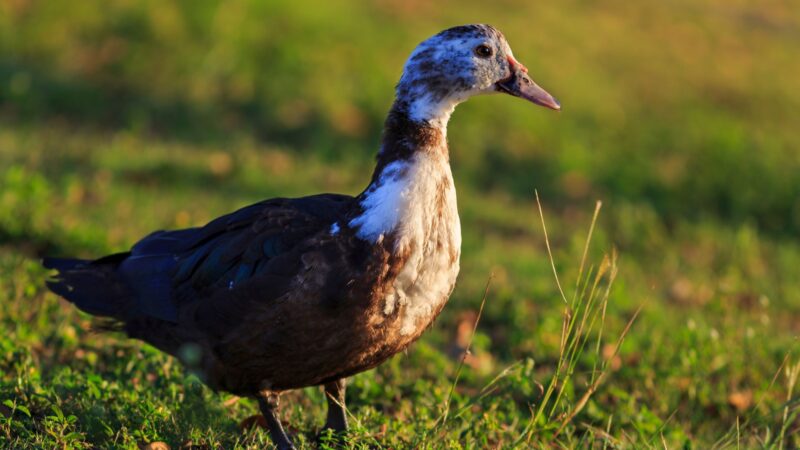
Related: How to Get Rid of Mallard Ducks | 10 Reliable Solutions
What Do the Muscovy Ducks Look Like?
The Muscovy duck, which is regarded as the biggest in North America, has a long beak, long neck, and thick face warts. They have wingspans of 137 to 154 centimeters, are 66 to 84 centimeters long, and weigh 2.7 to 6.8 kilograms
What Color Are Muscovy Ducks?
Under good lighting, wild birds have primarily black plumage with white wing patches and a greenish iridescence. On the other hand, domesticated Muscovy ducks come in a variety of plumage, including white, buff, lilac, brown, and blue. Additionally, the latter has patches that range in color from white to brown.
What Do Muscovy Ducks Eat?
Muscovy ducks follow an omnivorous diet mostly consisting of the stems, roots, seeds, and leaves of both terrestrial and aquatic plants. Additionally, they also feed on crustaceans, small fish, reptiles, and insects.
Where Do Muscovy Ducks Live?
These ducks prefer residing in forested areas near sources of water. They often nest in tree cavities and utilize trees as roosting areas. They can also be spotted foraging in shallow ponds, wetlands, and lagoons. Domesticated Muscovy ducks are frequent visitors of parks and farms.
How Do Muscovy Ducks Reproduce?
Breeding season typically begins in August and lasts until May. Females are able to lay 8 to 15 white or greenish white eggs per clutch. They have a rapid rate of reproduction, being able to produce up to 15 clutches in a single year.
Related: How to Get Rid of Robins? | 8 Effective, Natural, and Humane Solutions
Are Muscovy Ducks a Nuisance?
Yes. Muscovy ducks, if left undealt with, can definitely become quite a nuisance in a lot of environments. Here are some of the reasons why:
- Plant damage: Muscovy ducks are known to graze, pull, trample, and foul crops. They prefer doing so to grain crops such as corn, wheat, and cereal grains.
- Impact native ecosystems: These ducks are known to interbreed with native duck or wild waterfowl species. This leads to a drastic increase in their populations, especially in urban areas
- Competition with native wildlife: Since this species is introduced to many locations in the United States, they can aggressively compete over resources with native wildlife species.
- Unsightly fecal droppings: Producing a whopping amount of feces, Muscovy ducks can damage lawns, yards, and golf greens. This reduces the landscape and recreational uses of these areas.
- Spread diseases: Additionally, their fecal droppings can contaminate water sources such as ponds. This becomes a threat to the lives of other waterfowl and nearby poultry since they can cause avian diseases.
Related: How to Get Rid of Seagulls | Effective Strategies and Prevention
Can Muscovy Ducks Spread Disease to Humans?
No. Thankfully, there has not been any recorded cases or evidence of Muscovy ducks being able to spread diseases to humans.
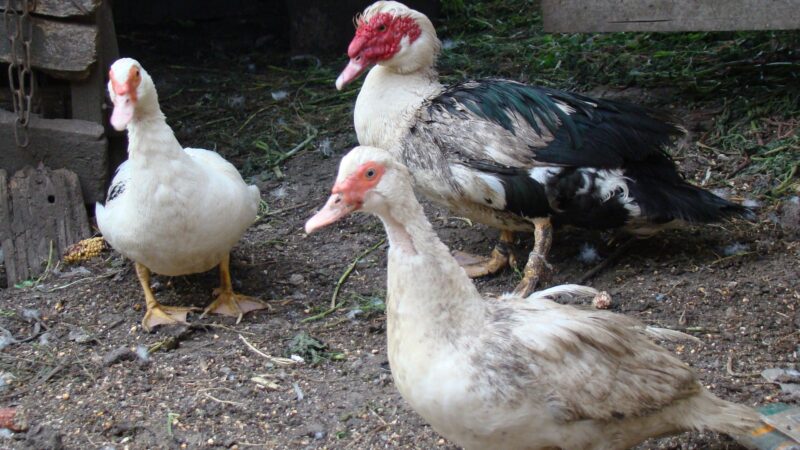
Do Muscovy Ducks Pose a Threat to Other Animals?
Yes. Muscovy ducks can spread avian diseases to other waterfowl and poultry they can come in contact with. Common diseases include avian cholera, botulism, salmonellosis, duck plague, and avian influenza.
Why Should Muscovy Ducks Be Removed?
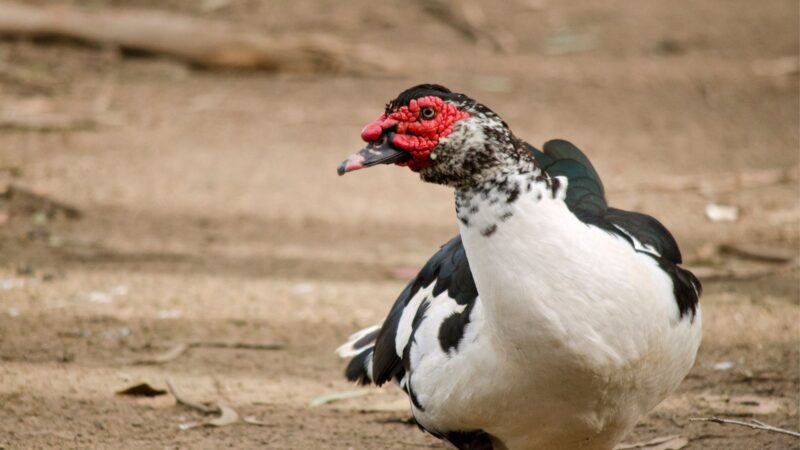
Getting rid of Muscovy ducks and keeping these birds away from your property will save you, the environment, and surrounding animals from the damage they can cause.
How to Get Rid of Muscovy Ducks in Your Yard?
Try out these simple but effective strategies in getting rid of these nuisances in your yard:
- Dispose of any food and water sources: These temptations are one of the common reasons why Muscovy ducks wander in your yards in the first place. Removing them is the most efficient solution. This includes edible scraps and leftovers in compost pits and securing garbage bins.
- Perform exclusion techniques: Seal off entry to ponds, gardens, and other landscapes by installing fencing (preferably electric, with at least 3,000 voltage power) or bird netting (wire mesh or nylon).
- Install and strategically place deterrents around your yard: This includes visual frightening devices (e.g. fake predators, reflective tape, metallic strips, and bird lighthouses) and auditory scare devices (e.g. ultrasonic sound devices and distress call sound systems).
- Simply chase them away: When you see a pair of Muscovy ducks together, they may be on the hunt for a potential nesting site. To prevent them from nesting in your yard, simply chase them away. Plus points if you bang metal pots together or generate loud noises using other objects.
Related: How to Get Rid of Canada Geese in Your Yard? | 14 Affordable Solutions
How to Get Rid of Muscovy Ducks in Your Pool?
Although Muscovy ducks are unable to swim as efficiently as other ducks, they can still go into your pool especially if it’s shallow. Here are steps you can do to get rid of them:
- Install a vinyl, polypropylene, or polyethylene pool cover: This serves as a barrier against Muscovy ducks planning to go into your pool. Ensure that the product is UV-stabilized so it doesn’t deteriorate easily.
- Strategically place a floating predator decoy around the pool: Additionally, you can also use bright- or vibrantly-colored toys as they will be greatly discouraged by these objects.
- Constantly keep the pool’s chemistry in check: Observe the proper levels of pH, alkalinity, water hardness, and dissolved solids. This reduces the attractiveness of your pools towards Muscovy ducks.
- Consider purchasing an automatic pool cleaner: If you don’t have one already. Since ducks are easily scared by loud or abrupt noises, the device’s sound will undoubtedly scare them away.
- Note:The vacuum requires at least a 3/4hp swimming pool pump or...
- Easy to Set Up and Efficient Cleanning and Super Quietly. This...
- Great Suction Power and Can't Stuck, This automatic pool cleaner...
- Save Your Time, Make Your Life Easier. Our pool vacuum provide a...
- Worry-Free Guarantee . One year warranty, if any part of this...
- Operates 100% on solar power, automatically and continuously...
- Features a cutting-edge Aqua Dynamics design, providing...
- Swift recharge time: only 5-6 hours under direct sunlight while...
- Patented twin Salt Chlorine Tolerant (SCT) motors power the...
- Large fine-mesh (200 um) debris basket with a top handle allows...
- Two Adjustable Navigation Modes: The PoolPure Aquaguard SE II...
- Premium Waterproof Construction: This cleaner is built with...
- Long-Lasting 5000mAh Battery: With its powerful 5000mAh battery,...
- Dual-Motor Suction Power: Featuring dual 30W waterproof motors,...
- Effortless Autonomous Operation: Start your cleaning session with...
Related: How to Get Rid of Barn Swallows? | 8 Prevention Tips
How to Chase Muscovy Ducks From My Property?
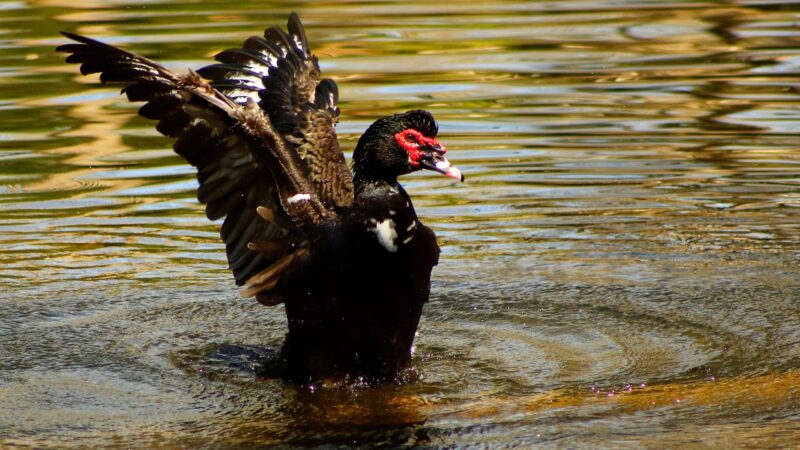
You can do so by employing the following techniques:
- Use a water-filled spray bottle or garden hose: Make sure it has low to medium pressure to prevent inadvertently harming the birds. This immediately puts them off from coming back into your property.
- Frighten them by creating loud noises: Slam metal pans and pots together while chasing them away. You can also opt to use bird bombs, shell-crackers, or screamers. Be cautious around your neighbors though, since they could find this loud and annoying.
- Install a motion-sensitive sprinkler system: This automatically keeps ducks from entering your yard. Make sure to choose a product that has a wide coverage.
How to Trap Muscovy Ducks?
Check with your local regulations first before planning to trap Muscovy ducks as it may be prohibited by the state without proper permits or without a professional wildlife expert present.
Walk-in funnel traps, with a bait inside, are the most suitable types of traps to capture Muscovy ducks. Place them near sources of water, open areas, or other areas frequented by the birds.
Once they have entered the trap and cannot escape, immediately contact your local wildlife officials so they can properly perform relocation.
What Do Muscovy Ducks Hate The Most?
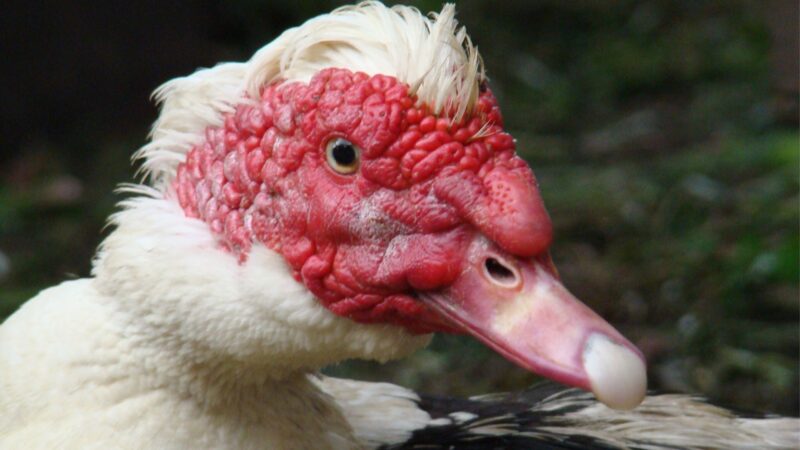
Muscovy ducks get scared easily. Therefore, they dislike objects and devices that may threaten their safety such as the following:
- Decoys and models that resemble predators. These include fake owls, swans, alligators, and hawks.
- Shiny, reflective, or iridescent objects that emit erratic light.
- Loud or sudden, startling noises.
By using a combination of the strategies mentioned earlier, Muscovy ducks from your property will be effectively and efficiently deterred. Additionally, it also helps prevent them from ever coming back!
List of Sources
All About Birds. (n.d.). Muscovy Duck.
Audubon. (n.d.). Muscovy Duck.
Carpenter, J., Donaldson, S., & Hefner, M. (2011). Dealing with Nuisance Wildlife.
Cleary, E. C. (1994). Waterfowl.
Oklahoma State University. (n.d.). Muscovy Ducks.
- How to Get Rid of Copperheads | Practical Guide - August 27, 2023
- How to Get Rid of Corn Snakes | What Makes Them Aggressive? - August 27, 2023
- How to Get Rid of Alligators | Safety Measures and Removal Methods - July 16, 2023



